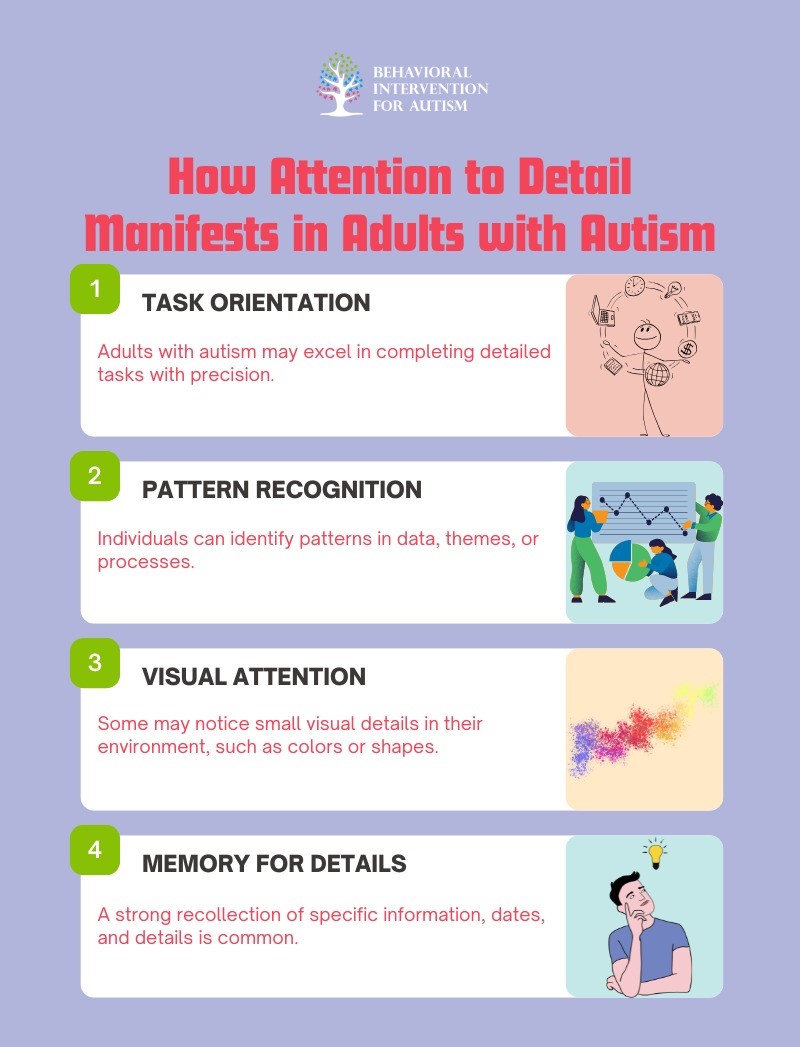
Table of Contents
Autism Spectrum Disorder impacts an individual’s ability to communicate, socialize, and manage behavior. It encompasses a wide range of symptoms and abilities, leading to varying levels of difficulty and strength among individuals.
The diagnostic criteria for autism typically involve challenges in social communication and the presence of restricted interests or repetitive behaviors. The degree of these symptoms can vary significantly, leading to the term “spectrum.”
The Link Between Attention to Detail and Autism
Understanding the relationship between attention to detail and autism is essential for parents and caregivers of individuals on the spectrum. This connection can significantly impact various areas of life, including social interactions, education, and employment.
How Attention to Detail Manifests in Adults with Autism
Attention to detail in adults with autism can present itself in several distinct ways. Individuals may become intensely focused on specific tasks, often displaying a high level of accuracy and thoroughness. This concentrated focus is often coupled with an exceptional ability to notice patterns, discrepancies, or nuances that others may overlook.

Importance of Recognizing and Understanding This Trait
Recognizing and understanding attention to detail in adults with autism is vital for fostering their strengths. Acknowledging this trait can lead to enhanced opportunities for learning and employment, allowing individuals to thrive in settings that utilize their skills.
Benefits of Recognizing Attention to Detail | Outcomes |
Improved Support | Tailored approaches can enhance learning and work environments. |
Increased Self-Esteem | Understanding strengths can boost confidence in individuals. |
Advocacy and Awareness | Promoting awareness can lead to better acceptance in various social contexts. |
Optimized Skill Utilization | Enabling individuals to leverage their attention to detail in vocational settings can lead to job satisfaction and success. |
Understanding how attention to detail manifests and its importance allows caregivers to provide better support for adults with autism. These insights can help cultivate environments where these individuals can succeed and feel valued.
Positive Aspects of Attention to Detail in Autism
Attention to detail is a notable trait among many adults with autism. This characteristic can lead to several positive outcomes in various aspects of life, particularly in problem-solving and focus.
Enhanced Problem-Solving Skills
Adults with autism often exhibit an exceptional ability to analyze information and identify patterns. Their keen attention to detail allows for a thorough examination of problems, leading to more effective solutions. This skill is particularly valuable in fields that require precision and analytical thinking.
Increased Focus and Concentration
Adults with autism often possess heightened focus capabilities. This superior concentration enables them to immerse themselves in tasks, resulting in high quality of work and exceptional productivity. The ability to concentrate for extended periods can be an asset in both educational and professional settings.
The positive aspects of attention to detail in adults with autism are valuable traits that can enhance their problem-solving abilities and concentration levels. Understanding and nurturing these skills can lead to improved outcomes in various life domains.
2 Challenges Associated with Attention to Detail in Autism
While attention to detail in adults with autism can present numerous strengths, it can also lead to specific challenges that impact daily life. Two significant challenges include difficulty with flexibility and adaptability as well as social implications and communication hurdles.
Difficulty with Flexibility and Adaptability
Adults with autism may struggle with changes in routine or unexpected events. Their strong focus on specific details can make it hard to adjust to new circumstances. This rigidity can manifest in various settings, affecting work and personal lives.
Social Implications and Communication Challenges
Attention to detail in adults with autism can also present obstacles in social contexts. The intense focus on specific interests or details may lead to challenges in engaging in typical conversations or interactions.
Recognizing these challenges is crucial for parents and caregivers as they strive to create supportive environments that respect and accommodate the needs of adults with autism. Understanding the difficulties associated with attention to detail can pave the way for more effective communication and social integration strategies.
Supporting Adults with Autism and Attention to Detail
Supporting adults with autism who exhibit a strong attention to detail involves creating conducive environments and implementing effective strategies. We’ll explore ways to enhance their strengths and offer the support they need.
Tailoring Environments to Support Attention to Detail
Creating an environment that nurtures attention to detail can significantly benefit adults with autism. This involves structuring their surroundings to minimize distractions and promote focus. Consider the following aspects:
Environment Aspect | Recommended Approach |
Lighting | Use natural or soft lighting to reduce glare and avoid overstimulation. |
Noise Levels | Provide quiet spaces or use soundproofing to limit auditory distractions. |
Organization | Keep spaces tidy and organized, using labeled containers for items to promote ease of access. |
Visual Cues | Utilize clear visual aids such as charts and diagrams to guide tasks and expectations. |
Routine Structure | Establish a consistent daily routine to provide a sense of predictability and stability. |
These adjustments can enhance the ability of individuals to engage with tasks requiring attention and facilitate a more comfortable and effective setting.
5 Strategies for Building on Strengths
Building on the strengths associated with attention to detail involves using targeted strategies that leverage this capability. Parents and caregivers can implement the following techniques:
Strategy | Description |
Skill Utilization | Identify specific skills related to attention to detail, such as analytical thinking, and provide opportunities for their application. |
Career Development | Encourage exploration of careers or hobbies that require detail-oriented skills, such as data analysis, graphic design, or quality assurance. |
Incremental Challenges | Gradually introduce challenges that require attention to detail, allowing individuals to build confidence and competence in handling complex tasks. |
Positive Reinforcement | Offer praise and rewards for meticulous work and progress to reinforce desired behaviors. |
Collaborative Learning | Foster group activities where individuals can share and discuss their perspectives, allowing them to appreciate different viewpoints while staying rooted in their detail-oriented approach. |
By tailoring environments and implementing supportive strategies, caregivers can effectively nurture the strengths associated with attention to detail in adults with autism. These practices not only enhance individuals’ capabilities but also contribute to their overall well-being and confidence.
Take the Next Step Toward Personalized Support
If you or a loved one needs help navigating challenges related to attention to detail, we’re here to guide you. At Behavioral Intervention for Autism, we offer high-quality ABA therapy services tailored to individual needs. Our dedicated team focuses on building essential skills that empower adults with autism to thrive in daily life. Ready to make a change? Reach out today and discover how our expert-led ABA programs in Florida can provide the support you’re looking for. Don’t wait—connect with us now and let’s work together toward meaningful progress.
Sources:
- 9 Common Obsessions of Children With Autism You Should Know - February 25, 2025
- What is Neurodiversity? A Guide to Embracing Differences - February 25, 2025
- Understanding Hyperfocus in Autism: What It Means and Why It Happens - February 25, 2025


